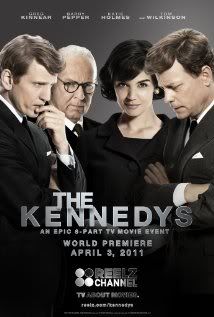No admirer of the Kennedy clan, I doubt I would have donated any time to watching the TV mini-series The Kennedys, except that the Kennedy family reportedly managed to cow every major network into refusing to run it. That persuaded me to see the program (now released on DVD and available from Netflix) just to get back at them. So there.
The technical skills that went into making The Kennedys -- a Canadian production -- are impressive; so much so that this would be something of a modern classic if only ... well, if only the Kennedys were more interesting.
To start with the creditable aspects of the mini-series, Greg Kinnear is JFK to the life. He has it all spot on: the accent, the cadences of speech, the half-conscious gestures, the smooth, not quite human persona that the TV cameras loved. But he gives us more than just a clever imitation. In the domestic scenes, Kinnear conveys without obvious mannerisms the president's constant physical pain; suggests a depth of thought that may or may not have been present in the real JFK, but rewards the viewer and justifies so much screen time. Kinnear deserves other roles worthy of his immense talent.
Just as impressive is Barry Pepper as Bobby, almost as prominent in the script as John. Kinnear and Pepper seem to have coordinated their performances -- not only are they individually convincing, but believable as brothers who were raised in the same nest. It almost goes without saying that Tom Wilkinson dramatizes the Old Man splendidly. Kristin Booth, playing Ethel Kennedy, Bobby's wife, is also good, as are several of the actors in supporting roles (but there are also a few duds, like the player who caricatures the general in Cabinet meetings).
As for Katie Holmes as Jacqueline ... I don't want to be snide. She obviously works hard at the characterization, but that's part of the trouble: you're conscious of her effort, which you wouldn't be with acting of a higher caliber. She can't replicate Jackie's distinctive voice: managing the silkiness all right, but the accent is Park Avenue, not aristocratic Virginia horse country. To give her her due, though, she creates affecting moments now and then.
The scriptwriter faced a no-win situation. If the screenplay had stuck to the private lives of the characters, it would understandably have been derided as high-class soap opera. But including all the famous events of the Kennedy presidency and beyond -- the 1960 campaign, the Bay of Pigs debacle, the Cuban missile standoff, Dallas, Bobby's run for president and his appointment with fate -- flirts with dramatic nullity. We, the audience, either remember the actual events or have seen them on film. Recreating relatively recent historical events only results in wax museum scenes.
As for the family drama, we learn pretty much all there is to know early: Joe Kennedy Senior is shrewd but cold; invests his ambitions in Joe Junior, who is killed in the war; John inherits his father's ambitions but not his respect; John's rise to glory is overshadowed by Joe Senior's authority.What follows is variations on the theme, and not especially effective ones.
Actually, it's hard to see why the remaining Kennedy family would have gone to the bother of trying to suppress this program. It's soft on everyone but Dad, and even he has been steam cleaned. Unless I missed it there is nary a mention that he made the family fortune by bootlegging and cooperation with organized crime during Prohibition; that he was recalled as ambassador to Britain because of his pro-German sympathies (the script implies that he was double-crossed by a vicious Roosevelt). Some of the few compelling scenes take place with the presidential election as background, with Joe and Frank Sinatra conniving with mobster Sam Giancana -- if anyone protested The Kennedys, the Sinatra estate should have; it presents Sinatra (whom Joe patronizingly calls "Francis") as a low-order criminal lackey. But Joe's role in buying his son the election through the Chicago Democratic machine, while alluded to, is played down.
What about all JFK's now-famous dalliances? They, too, are perfunctory. Judith Exner is onscreen for half a minute; another playmate struts and frets her seconds on stage and is gone. Marilyn appears only in seducing Bobby.
Even in eight episodes, there isn't time to peer too closely into all the sordid doings of this riff-raff family elevated to the presidency through money, connections, and a fawning press. Teddy never appears or is mentioned. Can we hope that someone will make an honest biographical film about that black sheep, the full-time drunk and satyr who co-sponsored the bill that enabled mass Third World immigration? Well, we can hope.




No comments:
Post a Comment